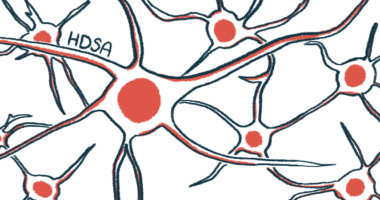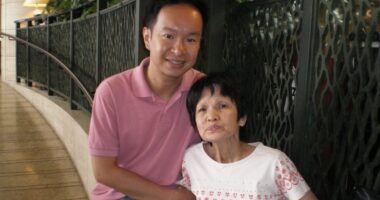Just because you have HD doesn’t mean HD causes everything
The truth behind what we'd thought were Huntington's disease symptoms

My wife, Jill, recently discovered that what she’d thought was a symptom of her Huntington’s disease (HD) was really something else.
It reminded us that just because she has a rare, terminal illness doesn’t mean it’s the cause of every medical issue. I began to realize this after her recent annual physical, when I saw the relief in Jill’s eyes after the doctor shared her latest bloodwork results.
After she’d spoken with the doctor, I asked what she was so concerned about. She acknowledged that she’d been feeling tired “all of the time, for months.” Talking with her doctor, Jill told me, had given her a greater understanding of what was going on.
I’d noticed a shift in Jill’s energy level, but I wasn’t concerned because our schedule had been hectic during the past few months. We went on a cruise in Europe, visited family in Pennsylvania and Massachusetts, and traveled to New York several times. In addition, I was hospitalized for an infection; we had several visits from family; my 26-year-old nephew recently stayed with us for more than a month; and Jill caught something that kept her in bed for three days.
So hearing Jill was tired wasn’t all that surprising. The problem is that Jill’s concept of tired is what most people would consider high energy with a side order of espresso.
I did notice she’d been having more frequent yawns, larger bags under her eyes, and low motivation when we weren’t traveling or visiting family. But she didn’t complain, so I assumed she was experiencing the typical HD progression.
Correcting our assumptions
She explained that she slowly understood how much being tired had affected her life and that, contrary to my assumption, her current issues were all caused by her malfunctioning thyroid.
I didn’t know much about how the thyroid gland affects us, so I looked it up. This small, butterfly-shaped gland is in the front of our necks and makes hormones that control the way the body uses energy. These hormones affect nearly every organ in our bodies and control many of our most important physical functions.
Jill started tearing up as she told me she’d assumed HD had caused her fatigue. She said she’d accepted that her weariness was her “new normal,” but was “so relieved” to know she was wrong.
As a loving. caring husband, I took a big breath, paused our conversation, and asked her to repeat what she’d said.
She looked puzzled, but assumed my attention-deficit/hyperactivity disorder had caused me to miss part of what she’d said. She started the story again, but I shook my head. Again, she looked puzzled. Then, a small smile appeared on her face. She got it.
“Funny. You are hilarious,” she said, rolling her eyes. “Yes, Carlos, I was wrong.” This from Jill, who prides herself on never being wrong. “But, my love, so were you. You noticed my decline and made assumptions. You thought I was tired because HD was making me that way.”
She was right; I hadn’t pushed her to figure out what was happening.
“I understand I need to be my own advocate,” Jill said. But then she reminded me that, as her HD symptoms worsen, she needs to depend on me to notice changes in her behavior because she may not.
“That’s what being a caregiver is all about,” she said. “You’ll one day need to see changes in me so my doctors know what’s happening and can change my treatment if needed.”
Jill likes to call this sort of realization a “lightbulb moment.” Ignoring symptoms or blaming them all on HD can harm her health, she said.
For myself, I now have a deeper understanding of how easy it is to get into the habit of blaming HD for all of the things that affect her. But I promised I’d make an effort to talk to her about what I see. Hopefully, this new issue will be the last she experiences for a while, but if not, I’m ready to face them with, or for, Jill.
Note: Huntington’s Disease News is strictly a news and information website about the disease. It does not provide medical advice, diagnosis, or treatment. This content is not intended to be a substitute for professional medical advice, diagnosis, or treatment. Always seek the advice of your physician or other qualified health provider with any questions you may have regarding a medical condition. Never disregard professional medical advice or delay in seeking it because of something you have read on this website. The opinions expressed in this column are not those of Huntington’s Disease News or its parent company, Bionews, and are intended to spark discussion about issues pertaining to Huntington’s disease.








Rex
And exactly what ARE the early symptoms of HD progression? A skipped or missed word? Clumsiness? Mild choking when eating or drinking? Anxiety? Hyper-activity? Hearing loss? Hyper-vigilance on the part of the spouse/caregiver is certainly one of the more prominent effects with discrimination between HD symptomology and age progression nearly impossible (in the early stages of HD). At what point do we declare, "well, he has HD, you know" as a very painful explanation of something that has now progressed to the obvious? I admire Jill and Carlos for being able to discuss candidly whether or not "this" is or is not a function of her HD condition. When the affected person is unwilling to discuss potential symptoms because of the emotional stress of acknowledging HD it creates a lot of stress for the caregiver and other family members. Keep sharing Carlos and Jill, you are an inspiration.
Carlos Briceño
Thank you for your kind words. What you wrote was beautifully put. I am hopeful that talking about HD and working with the medical community to update the "old way" of dealing with HD is possible. Meaning, families find a way to talk about it and then we need to have the diagnosis criteria changed so the people who do try to get help don't hear "Well, I don't see any signs of HD" from their doctor. So many people take that victory and ignore things they should be dealing with. I think a lot of the anger comes from years of not understanding why things are happening to them. I think if we started treatment earlier people have a better chance of being independent longer. If we keep waiting until people show physical symptoms, people with HD will continue to be a hidden not talked about disease.
Becky Field
Thank you so much for this wonderful column. It reminds me of when I was caring for my dad who had HD. Dad had an unrelated ear infection, causing him balance issues. I assumed it was due to his HD progression. It was our family GP that reminded me, not everything was necessarily a symptom of HD. He could still get other infections and conditions. I never forgot this and have been mindful of it ever since. Becky
Carlos Briceño
Hello Becky! And welcome to the family! I am so happy to see more people sharing their stories about HD. I believe we are shining a light on a disease that affects so many families. I hope sharing our stories gives comfort to those who feel sad, knowledge to people looking for answers, and support for those who live with HD every day. I am happy you are here, but sad for the reason behind it.
Julie
Hello! This post intrigued me, as I too tend to blame every symptom on “what if it’s Huntingtons…” I found out I was gene positive in 2019 but not yet exhibiting any markers for disease progression, so still struggling to maintain balance in that “pre-clinical” phase… it’s a hard place to be. Just curious, is your wife also in the pre-clinical stage, or is she exhibiting symptoms that are recognized as disease progression? If you are not comfortable disclosing that info I understand. I appreciate your posts :)
Carlos Briceño
Julie,
I am so sorry to hear about your struggles. I think HD has become the "boogeyman" in our lives, because the disease is not understood, studied, diagnosed, or treated in a way that is helpful for many patients. Jill and I both have issues with the disease not being a disease until it is too late to do anything about. Jill's symptoms are what made her get tested, so when they said she "wasn't showing symptoms at that time" of HD, I didn't understand. There are so many unknowns in the field it's hard to say what causes what. Did HD cause Jill's thyroid problems or was it her thyroid making her HD symptoms worse? I am hoping that what we are doing with this column will help bring these issues to the surface, so there can be less fear and a better understanding of something that should not be hidden.